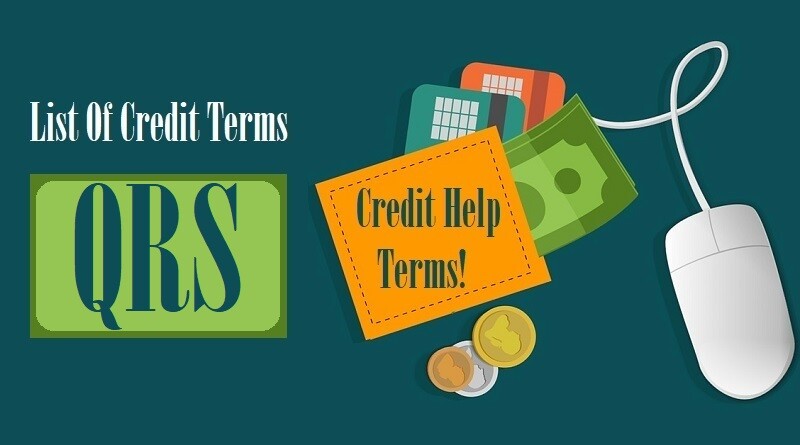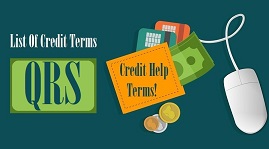
List Of Credit Terms Q R S

Confused By The Credit Terms?
Our glossary of credit terms will help you learn the most common financial terms, words, and phrases, as well as the meaning for dozens of legal and credit terminology terms alphabetically.
A |
B |
C |
D |
E |
F |
G |
H |
I |
J |
K |
L |
M |
N |
O |
P |
Q |
R |
S |
T |
U |
V |
W |
X |
Y |
Z
Q
Qualifying Income – Minimum monthly income range required to qualify for a loan payment.
R
Rate Earned on Savings – This is the rate you earn on short-term savings. For most people this is currently 4% to 5% annually.
Rate of Depreciation – The rate of depreciation gauges how fast your new purchase – automobile, computer, etc. – will lose its market value. High depreciation rate is about 20% per year, medium is 15% per year and low is 10% per year.
Rate Cap – The maximum amount that the interest rate on an adjustable rate mortgage can rise in a single year.
Real Estate Secured Debt – Any debt that has been used to buy a home or has been secured by your home. For example, a home equity loan can be a real estate secured debt.
Reference Rate – A base-rate, such as the prime rate, used in the calculations of variable credit card interest rates.
Refinancing – entering into a new credit agreement which replaces one or more prior agreements.
Released – This means that a lien has been satisfied and is no longer in effect.
Repossession – After a borrower is significantly behind on payments, a creditor takes possession of property pledged as collateral on a loan contract to pay off the remaining loan amount.
Request an Investigation – If you believe that information on your report is inaccurate, you can request an investigation of the information. The credit bureaus will ask the sources of the information to check their records at no cost to you. Incorrect information will be corrected; information that cannot be verified will be deleted. Accurate information cannot be removed from your credit report. An investigation may take up to 30 days. When it is complete, the credit bureau will send you the results.
Request For Your Credit History – This is a request for your personal credit report. Consumers’ credit reports contain information credit grantors can’t see such as a detailed history of when your credit information is viewed by credit grantors or employers.
Residual Percent – For leases, this is the remaining value of the property you’re leasing at the end of the lease term. The higher this amount, the lower your lease payment will be.
Retail Card – A plastic payment card issued by a specific retailer or group of retailers for limited use at their own outlets.
Revolving Account – An account from which credit is automatically available up to a predetermined maximum limit as long as a customer makes regular payments.
Revolving Account – a credit account to which additional purchases may be made, to which finance charges are assessed on any outstanding balance, and which may be paid in full at any time (see openend credit).
Revolving Debt – Debt owned on an account that the borrower can repeatedly use and pay back without having to reapply every time credit is used. Credit cards are the most common type of revolving debt.
Revolving Facility – In which you can extend your credit or debt in number of months or year by pay just portion of amount, which may be 10 percent or so. Credit cards are the most common type of revolving debt.
Reward Program – A program offered by credit card issuers that gives cardholders rewards for using their credit card in the shape of reward points. Credit card user collect reward points every purchase made and charge through the credit card. You can usually redeem these points in merchandise, travel or cash, depending on the program.
Risk Level – In determining credit scores, lenders place you in a risk category that compares you to a large number of consumers with similar credit histories. This allows lenders to compare “apple to apples,” ensuring that your credit behavior is judged in a context that is relevant and fair.
Risk Score Models – A tool used by credit grantors to predict future payment behavior of consumers.
S
Sales Price – Total price for an item, including taxes and fees.
Sales Tax – Total amount of sales tax on a purchase.
Sales Tax Rate – Percentage sales tax to be charged on a purchase. Sales tax for buying is charged on the total sales amount. In the case of a lease, sales tax is only due on the amount of the lease and is added to each lease payment.
Satisfactory Accounts – Accounts that are current or have been paid satisfactorily.
Satisfied – If a consumer has paid all the money the court says he/she owes, the judgment is called “satisfied.”
Scheduled Payment – Payment due at a scheduled time. In the case of a home, the monthly principal and interest payment is based on your original mortgage amount, term and interest rate.
Score Factors – Score factors are elements from your credit report that drive your credit score. For example, such elements as your total debt, types of accounts, number of late payments, and age of accounts are what determine your credit score. Score factors can have a positive or negative affect on your credit score.
Secured Credit – Loan for which some form of acceptable collateral, such as a house, car, or deposit has been pledged.
Secured Credit Card – A card for which the financial institution requires a collateral deposit to be kept to cover purchases made with the card (also called a collateralized credit card).
Security – Real or personal property that a borrower pledges as collateral for the term of a loan. Should the borrower fail to repay, the creditor may take ownership of the secured property by following legal procedures.
Security Alert – A statement that is added to one’s credit report when a credit bureau is notified that the consumer may be a victim of fraud. It remains on file for 90 days. A security alert suggests that creditors should request proof of identification before granting credit in that person’s name. Once a security alert has been added, your report will no longer be available for online viewing. You may still receive your report through the mail.
Security Deposit – The amount you deposit with a credit card issuer as security to obtain a secured credit card.
Security Interest – The creditor’s right to take property or a portion of property offered as security (collateral) for a loan.
Seller’s Points – A lump sum paid by the seller to the buyer’s creditor to reduce the cost of the loan to the buyer. This payment is either required by the creditor or volunteered by the seller, usually in a loan to buy real estate. One point equals one percent of the loan amount.
Service Charge – A component of some finance charges, such as the fee for triggering an overdraft checking account into use.
Settlement Costs – This includes all fees paid to the lender and mortgage broker, and certain other fees paid to third parties for services that the lender requires the borrower to purchase. The remaining settlement costs involve payments to third parties, which lenders do not control and for which they cannot ordinarily provide accurate information until later in the origination process. As the borrower, you should shop around because the lender knows what they are.
Smart Card – Electronic prepaid cash card, usually sold at banks and are exchanged at face value.
State Tax Withholding – Total amount withheld for state taxes.
Statement – A bill summarizing all of the activity on an account within a specified period of time. A credit card statement is the monthly bill from a credit card issuer that describes and summarizes the activity on an account. Most credit card statements include the outstanding balance, purchases, payments, credits, finance charges, and other transactions for the month.
Statement Date – The date on which a statement is created, and the date used to calculate finance charges (interest) for the statement period.
Statistical Models – Statistical models are used to generate credit scores. Modelers analyze credit reports from millions of consumers to identify the variable that most likely determine future creditworthiness, which is expressed in the form of a credit score.
Stock Index – A device that measures changes in the price of a basket of stocks, and represents the changes using a single figure.
Surcharge – An extra fee for using a service. Surcharges are also referred to as convenience fees and are commonly presented when using ATMs.
